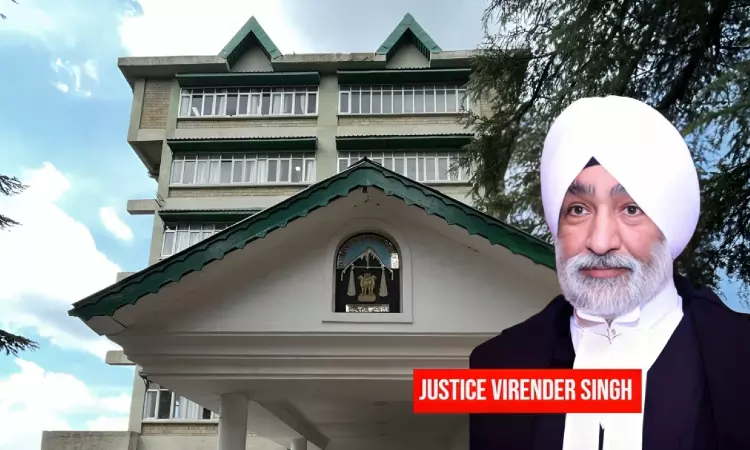- Home
- /
- High Courts
- /
- Himachal Pradesh High Court
- /
- Separate Orders Must Be Passed For...
Separate Orders Must Be Passed For Cancellation Of Bail Bond And Imposition Of Penalty: Himachal Pradesh High Court
Mehak Aggarwal
16 May 2025 3:00 PM IST
Himachal Pradesh High Court held that Courts must pass separate orders for the cancellation of a bail bond and the imposition of penalty under Section 446 of Criminal Procedure Code, ensuring that the affected person is given a fair opportunity to present their case before any penalty is imposed.Justice Virender Singh: “In the considered opinion of this Court, separate orders were required...
Himachal Pradesh High Court held that Courts must pass separate orders for the cancellation of a bail bond and the imposition of penalty under Section 446 of Criminal Procedure Code, ensuring that the affected person is given a fair opportunity to present their case before any penalty is imposed.
Justice Virender Singh: “In the considered opinion of this Court, separate orders were required to be passed by the learned trial Court, firstly, at the time of cancellation of bail bonds and secondly, at the time of imposing penalty. The legislature, in its wisdom, has used the words if sufficient cause is not shown for imposing penalty, then hearing of the person, affected by the said order, is mandatory” .
Background Facts:
The accused, Kamal Kumar, was arrested after an FIR was registered against him, alleging commission of sexual offences against a minor. Pursuant to his arrest, he filed a bail application u/s 439 of CrPC before the Trial Court. The Court granted him bail, as he executed a bail bond of Rs. 50,000/-, assuring that he would appear on every date of hearing.
Along with it, Bihari Lal, stood as the surety for the accused and assured the court that he would ensure the presence of accused on each and every date of hearing. However, on the first date of hearing, only the surety appeared and assured the court that he will bring the accused on the next date of hearing. However, on the next date both surety and the accused did not appear.
As a result, the trial court cancelled and forfeited the bail bond furnished by the accused and issued non-bailable warrants against the accused. It also initiated proceedings under section 446 of CrPC against both the accused and the surety.
Despite the issuance of non-bailable warrants, the accused did not appear. Consequently, the court published a written proclamation against the accused under Section 82 CrPC and ordered recovery proceedings against the surety, imposing a penalty of Rs.50,000/-
Aggrieved by the trial court's decision, the surety filed an appeal before the High court, stating that the trial court passed the order without giving him an opportunity to explain his absence and his inability to produce the accused.
Findings:
The High court observed that, as per Section 446 CrPC, two separate orders are required to be passed by the Court, firstly at the time of cancellation of the bail bonds and; secondly, at the time of imposing penalty.
In Ghulam Mehdi versus State of Rajasthan', 1960 the Supreme Court held that “before a surety becomes liable to pay the amount of the bond forfeited it is necessary to give notice why the amount should not be paid and if he fails to show sufficient cause only then can the Court proceed to recover the money. “
However, in this case the Trial Court had passed a composite order, cancelling the bond and imposing penalty simultaneously, without issuing prior notice to the surety. The High court remarked that this was in violation of the principles of natural justice.
The High Court held that “Hearing of the affected party, i.e. the surety, is mandatory, as non-affording of such opportunity of hearing would be gross violation of principle of natural justice. Even after forfeiting the surety bond to the State of H.P., the learned trial Court has failed to issue show cause as to why the amount of bail bond be not realized from him, by way of penalty”.
Thus, the High Court concluded that two separate orders should have been passed by the trial court, one for the cancellation of bail bond and another for imposition of penalty. As per Section 446(2) CrPC, only if sufficient cause is not shown by the surety for not imposing penalty, only then the court may proceed to recover the same.
Accordingly, the High Court set aside the composite order passed by the Trial Court and directed it to conduct fresh proceedings under Section 446 CrPC, ensuring that a notice is issued to the surety and that he is given a proper opportunity to present his case.
Case Name: Bihari Lal v/s State of H.P. & Ors
Case No.: Cr.Appeal No. 247of 2024
Date of Decision: 09.05.2025



